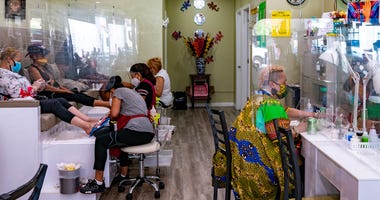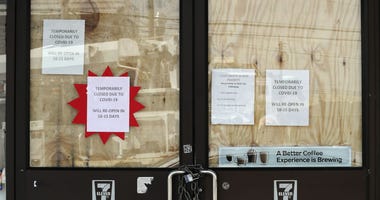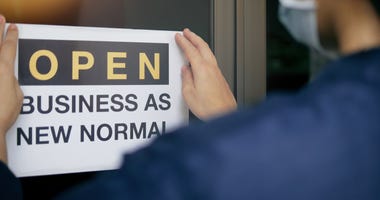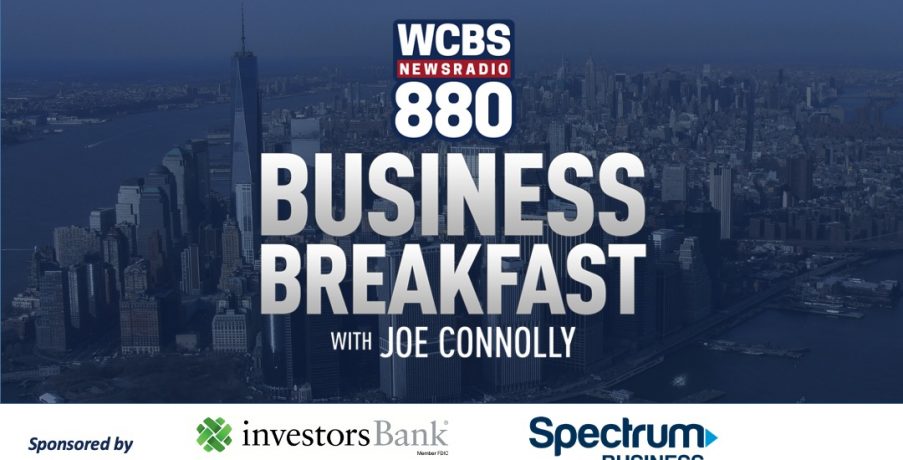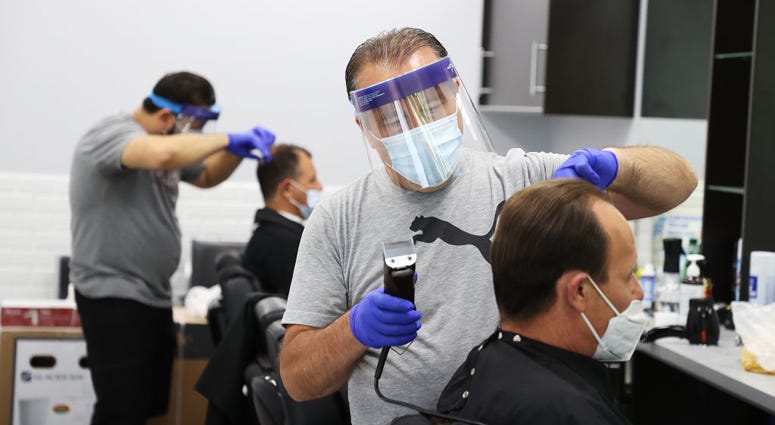
The Latest

Husband Sent Flirty Texts before Mica Miller’s Death, Waitress Says

Kristi Noem on Retraction: Kim Jong Un ‘Should Not be in the Book’

Kevin O’Leary: AI bossware can ID protesters and bar them from jobs

Neil A. Carousso Joins Growing NewsNation Network

Neil A. Carousso Departing WCBS 880

Art Business Founded by Former Foster Child Speaks to the Human Experience

1010 WINS Small Business $10K Challenge: Small Business Owners Make their Pitch for $10,000

NYC’s Élan Flowers Evolves into Blooming Subscription and Corporate Services
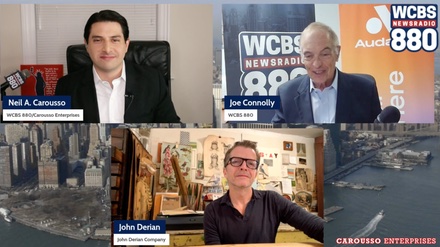
Creating an Authentic Retail Experience Online

WCBS Business Breakfast: Growth in the Hybrid Workplace
-
NYC Businesses Seek Ways To Boost Consumer Confidence
Post Views: 859By Neil A. Carousso
NEW YORK (WCBS 880) — Personal care services such as nail salons, massage parlors, tattoo shops and tanning salons turned on their lights in Phase 3 of New York City’s reopening this week, but indoor dining was halted because the airborne coronavirus spreads in closed environments with poor ventilation. The City is encouraging business owners to adapt and listen to health experts to dictate their economic future.
“As people begin to feel safe, they’re going to come out,” said New York City Small Business Services Commissioner Jonnel Doris on the WCBS Small Business Spotlight Podcast with Joe Connolly and Neil A. Carousso, sponsored by BNB Bank.
Doris was appointed by Mayor Bill de Blasio to lead the city agency through the pivotal survival and recovery period. He previously served as senior advisor and director of the Mayor’s Office of Minority and Women-Owned Enterprises. He also worked as chief diversity officer in Gov. Andrew Cuomo’s Office of Storm Recovery.
“There’s going to be some change in customer behavior,” Doris pointed out. “Make sure that you are as safe as possible. Do face coverings, make sure it’s on, make sure that you use social distancing; that’s going to bring the confidence level back, and then, we’re going to be able to see, really, the customer foot traffic pick up.”
He told Connolly and Carousso the Department of Small Business Services (SBS) has sent 5 million Personal Protective Equipment (PPE) items to City companies in the first three phases. He expects they’ll be able to distribute another 2.5 million masks, face shields, gloves and goggles.
“We’ve got a lot of resources for businesses that are ready to go particularly our restaurants who have really been hit hard during this time,” said Doris.
Restaurateurs had been preparing to welcome patrons inside by hiring and rehiring wait staff and ordering food from their suppliers, but now, many are turning to SBS for financial resources, including fundraising.
“Customers are eating out differently, they’re coming out different times, their likens have changed, they’ve been locked up for three months,” the City’s business leader said. “As they see and they hear from their customers, they are making changes and they’re pivoting.”
Doris said about 7,000 restaurateurs are engaged in the agency’s reopening program in which they provide tools and ideas for recovery.
“Financial resources and/or education really is key for the success of these businesses and that’s what we are able to provide,” he said.
Yudelka Carrera received operations training from SBS before she launched her catering and events-planning business Events By Yudy in 2015.
“During COVID-19, Yudy had to really transform her business from a catering company to preparing, now, and delivering lunches for people at home, healthcare workers, first responders and more,” Doris said.
President Donald J. Trump on Saturday signed an extension of the Paycheck Protection Program (PPP) low-interest loan that is forgivable if business owners use it to pay their employees. The original deadline for small businesses to apply for the program was last Tuesday, but $130 billion remained in the fund. Congress unanimously approved the extension for assistance until August 8.
Many prominent companies received millions of dollars in loans, including P.F. Chang’s China Bistro and Chop’t. The unintended assistance to large corporations has raised concerns that the government program funded owners with political connections. Doris is encouraging small businesses in need of capital to apply.
He points to three core principles for business owners in adapting to the so-called new normal: innovation, creativity and collaboration.
“We can’t do business like we’ve always done it before,” Doris said, continuing, “Industries got to work together, government and business needs to work better together, and that’s what we’re trying to do here.”
Hear examples of how business owners pivoted to survive and the financial and educational resources available to New York City companies on the WCBS Small Business Spotlight Podcast on the RADIO.COM app or the media player above.
-
Summer Businesses’ Blueprint To Recovery
Post Views: 809By Neil A. Carousso
NEW YORK (WCBS 880) — Seasonal businesses are hoping to mount a recovery starting with the 4th of July weekend, but that starts with safety.
Wendy Collins, co-owner of The Mission Inn Bed and Breakfast in Cape May, New Jersey, told Joe Connolly and Neil A. Carousso on the WCBS Small Business Spotlight, sponsored by BNB Bank, that typically, she would be booked solid through August by now. However, she remains “cautiously optimistic” that last-minute bookings will continue as the Tri-State Area moves forward with reopening in phases.
“Now, it’s probably on average a 15 minute conversation every time the phone rings,” Collins said.
Before the coronavirus pandemic, customers would only ask one or two questions before booking a stay.
“The questions are extremely detailed in terms of social distancing, are masks required, what are your cleaning protocols, what’s happening in the town with the restaurants,” she said.
Collins lists the cleaning products she uses and strict health protocols, including contact-free check-in and check-out on The Mission Inn website.
“The game has changed,” she said of the hospitality industry. “Patience is critical. Everybody is playing with new rules and trying to figure it out as we go, and if we’re just patient to each other and kind to each other, we’ll get through it.”
Collins says Cape May businesses are calling 2020 the “year of survival.” For her, that begins with building on the trust of her customers – 60 percent of whom are repeat vacationers at her four year old bed and breakfast.
“We’ve got a lot of strong people here, a lot of strong entrepreneurs, and we’re just trying to tread water in 2020 and get back, and hopefully, looking ahead to 2021,” she said.
Gabrielle Long co-owns two locations of Kai-Kai Sandals in Montauk with her brother, Kai Costanzo, and a boutique named Summer Stock at Gosman’s Dock on “The End” of Long Island. They also own Inn at Old Harbor on Block Island.
“Everybody has been very understanding, and also, kind of grateful,” Long told Connolly and Carousso of the health procedures she and her brother implemented to keep their employees and customers safe.
“At least in Montauk, there’s lines out on the street for people picking up a smoothie or going into the hardware store when it gets too crowded,” she described as capacity limits and social distancing prevent the usual crowds from congregating in her shops, especially on summer weekends.
Long concurs with Collins’ assertion that “patience is important.” She adds that communication with customers waiting on line, to reiterate the protocols are for their safety and that they will be inside the store as soon as possible, will make them feel more at ease as everyone adjusts to the “new normal.”
Her workers all wear masks and have been trained to practice and enforce social distancing and sanitize the store.
“Some of these policies that we have in place are not bad for the future,” Long said as she plans beyond this unusual summer season. “We’re not going to go back to how it was, so we’ve got more space in the store, and that allows for more space for customer,s and when we’re allowed to have more customers, great.”
Hear how businesses in local summer vacation spots have prepared for reopening with an eye on recovery on the WCBS Small Business Spotlight Podcast on the RADIO.COM app or the media player above.
-
5 Tips To Help Businesses Survive The Coronavirus Crisis
Post Views: 914By Neil A. Carousso
NEW YORK (WCBS 880) — Three local entrepreneurs who have proven sustainability through a series of essential pivots to survive the COVID-19 pandemic are sharing their advice for their peers in the business community.
Here are the major takeaways from the first-ever WCBS Virtual Business Breakfast, hosted by Joe Connolly.
Keep Your Ear to the Ground
Cindi Bigelow, third generation owner of Fairfield-based Bigelow Tea, relied on her experience and that of her team to make quick operational decisions that they would normally deliberate on for some time, because it was not an option as state and federal workplace health guidance changed rapidly.
“Listen to the sales people and encouraging the sales people,” Bigelow said as segments of her company’s revenue was wiped out amid the crisis and others have increased upwards of 200 percent.
Cindi Bigelow says segments of @bigelowtea’s revenue plummeted to $0 while others rose 200%.
See her advice for keeping your ear to ground on the Virtual #WCBSBizBreakfast with @JoeConnollybiz, sponsored by @investorsbank and @SpectrumBiz: https://t.co/409blHRGCm pic.twitter.com/87RrZsiHef
— WCBS 880 (@wcbs880) June 30, 2020
She has weekly meetings with her sales team to learn how customers and retailers behaviors have changed and what that means for Bigelow Tea’s future.
Bigelow also believes strongly in being the face of communications with customers and partners as an owner during this unprecedented crisis.
“I’m saying to my sales team, whether it’s a good news story or not a good news story, use me,” she said.
Do Not Undersell the Art of Communication
It may sound simple and obvious, but many business leaders fail to communicate effectively to both customers and employees. Michael Bednark, founder of Bednark Studio in Brooklyn, says ensuring everyone on the same page is especially important during a time of crisis.
Do not undersell the art of communication. That’s one tip from Michael Bednark of @bednarkstudio who saw the value in increased corporate and customer communications amid #COVID19.
More advice with @JoeConnollybiz: https://t.co/409blHRGCm
@investorsbank; @SpectrumBiz pic.twitter.com/jZcvYhBqVQ
— WCBS 880 (@wcbs880) July 2, 2020
“The feedback we got early on was that we weren’t communicating well enough and we weren’t fostering that community you naturally sort of have when everyone’s in a team setting and in an office together,” Bednark said.
“Clear communication, making sure that everyone knew what was going on, what was to come, and what we were unsure of,” said Bednark on how he improved in that area since March.
He needed just two weeks at the outset of the coronavirus pandemic to move his Brooklyn Navy Yard factory into a larger space in the historic industrial complex to ramp up a war-like manufacturing endeavor to provide Personal Protective Equipment or PPE to New York City hospital workers, beating the largest face shield producer, Bauer Hockey, to market with its design.
Spoiler alert! Michael Bednark of @bednarkstudio reveals how he is approaching negotiations with his landlord – @BklynNavyYard – first on the Virtual #WCBSBizBreakfast with @JoeConnollybiz and @NeilACarousso: https://t.co/409blHRGCm
Sponsored by @investorsbank and @SpectrumBiz. pic.twitter.com/HK0B6JAIM1
— WCBS 880 (@wcbs880) July 5, 2020
“I know we’re talking with the Navy Yard here, seeing what’s available to us,” Bednark answered WCBS Business Producer Neil A. Carousso’s question regarding negotiating with landlords. “Is there a way we can get some sort of rent abatement here to get us through the next few months, and then, see what happens on the other side or see if we can extend the lease with better terms?” he pondered.
Bednark Studio is currently hiring assembly line workers. In the last month, it began designing and installing plastic dividers for ride-sharing drivers’ cars to prevent the spread of coronavirus. Bednark shares its designs with other companies as an example of the community-focused businessman as the world grapples with the unprecedented health crisis that set off economic turmoil.
“Follow the Customer”
Joe Colangelo developed an app-based solution to commuter parking and had been thriving in the space until the pandemic shut down businesses and put the brakes on mass transportation. New Jersey-based Boxcar quickly pivoted to grocery delivery and pick-up, above ground pool installation, car detailing and drive-in movies for brand awareness.
“Talk to your customers.” @Itsjoeco of @boxcartransit explains how he pivoted into four new services after finding the demand.
See five ways to survive the pandemic with @JoeConnollybiz, sponsored by @investorsbank and @SpectrumBiz: https://t.co/409blHRGCm pic.twitter.com/enVHYKuOI0
— WCBS 880 (@wcbs880) July 6, 2020
“Talk to your customers on the phone. Just say, ‘Hey, can I grab you for fifteen minutes? I just want to hear what your problems are,'” Colangelo advised.
A defining moment: @Itsjoeco of @boxcartransit believes you will “build up the best brand if you treat people fairly right now.”
See how to pivot to survive on the Virtual #WCBSBizBreakfast, hosted by @JoeConnollybiz: https://t.co/409blHRGCm
@investorsbank; @SpectrumBiz pic.twitter.com/UhOs8wlVt4
— WCBS 880 (@wcbs880) July 7, 2020
“How did you want to act during this crisis?” reflected Colangelo. “Were you out there helping people, treating your counterparties, your partners fairly? Because, you will build up the best brand and that brand will be around for 30-40 years if you treat people fairly right now.”
Make Prudent Business Decisions
“Attack your cost line,” Colangelo emphasized.
He explained that cost-cutting is necessary and one way to start is by attempting to renegotiate subscription agreements. A merchant may be content with receiving a partial payment during the pandemic rather than taking a risk that a company could file for bankruptcy.
Make prudent business decisions: @boxcartransit founder @Itsjoeco tells @JoeConnollybiz how he has found good people willing to help in a time of crisis.
See tips for survival: https://t.co/409blHRGCm#WCBSBizBreakfast is sponsored by @investorsbank & @SpectrumBiz. pic.twitter.com/nW2ip56ojR
— WCBS 880 (@wcbs880) July 11, 2020
“This is a real crisis and what a crisis does is it brings out the best in good people,” the Boxcar founder said. “Talk to the people who have helped you over the years and not everybody’s going to be in the same situation, but a lot of them may be in a position to help.”
“Tell Your Story”
Ramon Ray from Smart Hustle Media submitted an audience question about how small businesses can utilize video in their marketing. Bigelow said she’s a “big fan” of using video to show prospective clients your personality.
https://twitter.com/wcbs880/status/1282287499839188992?s=20
“I think small businesses have a really unique story,” Cindi said, adding that video “Can give you that opportunity to have that transparency that people are really looking for as well as that ability to say why you’re different and what makes you special.”
-
WCBS Virtual Business Breakfast: Local Business Leaders Share Wisdom On Survival, Recovery
Post Views: 951By Neil A. Carousso
NEW YORK (WCBS 880) — Three local pioneers have made pivots to stay afloat and support their communities during the coronavirus pandemic.
Cindi Bigelow, third generation owner of Bigelow Tea, Boxcar’s Joe Colangelo and Michael Bednark of Bednark Studio shared their experiences with WCBS 880 business reporter Joe Connolly on the first-ever WCBS Virtual Business Breakfast, sponsored by Investors Bank and Spectrum Business.
“I try to pride myself on thinking ahead,” said Bigelow, who was forced to adjust her Fairfield, Connecticut factory operations and implement new safety procedures. “I found myself, really, just operating as fast as I could to try to keep up with what else we needed to do to do it right at Bigelow and for our employees. It was hard. It was a lot of work.”
Cindi said that at the height of the COVID-19 crisis, health guidance changed so rapidly that she and her executive team updated procedures multiple times a day. While sales for tea surged, other areas of her business continue to suffer and safety for her employees remains the priority.
Colangelo’s commuter parking app business plummeted 100 percent; revenue dropped to $0. The U.S. Navy veteran who served in Afghanistan was forced to pivot into a new line of business.
“Talk to your customers on the phone. Just say, ‘Hey, can I grab you for fifteen minutes? I just want to hear what your problems are,'” the Boxcar founder said of how he developed four new services in New Jersey.
Today, Colangelo’s Cranford-based company offers grocery pick-up and delivery services, car detailing, outdoor pools and shows drive-in movies, which help boost its brand awareness.
“There may be these ways that you can solve their problems that you haven’t thought of, yet,” the Naval officer turned entrepreneur said.
Michael Bednark transformed his Brooklyn Navy Yard factory from designing and manufacturing displays for clients, including Saks Fifth Avenue, to becoming an essential business by making face shields and Personal Protective Equipment (PPE) for New York City hospital workers. They actually beat the largest face shield manufacturer, Bauer Hockey, to market.
“I don’t want to go into a completely new business, but something that’s not that far off of an iteration of my business,” Bednark explained to Connolly and the Virtual Business Breakfast panel.
He said his mentality at the outset of the coronavirus outbreak in New York in March was focused on how he can help to “serve those people with the team and the equipment that I have.”
Bednark added a new COVID-19 product line last month by making and installing plastic dividers in ride sharing drivers’ cars to prevent the spread of the virus.
“How did you want to act during this crisis?” reflected Colangelo. “Were you out there helping people, treating your counterparties, your partners fairly? Because, you will build up the best brand and that brand will be around for 30-40 years if you treat people fairly right now.”
The entrepreneurial spirit on the panel was palpable, punctuated by the drive to serve their customers, employees and business partners in an unprecedented health and economic crisis that is fueling uncertainty and stress.
“It’s just constantly reassessing and listening more and taking all your years of experience and just keep pushing that envelope and keep pushing that bar up,” Bigelow said, adding, “No matter what, just keep trying.”
Watch the WCBS Virtual Business Breakfast above to learn innovative ideas to survive and recover from the pandemic.
-
‘Back to Work Does Not Mean Back to Normal’: LI Businesses Prepare For Unusual Summer Season
Post Views: 724By Neil A. Carousso
NEW YORK (WCBS 880) — There’s cautious optimism around Long Island’s recovery as the region sits in phase two of New York State’s reopening from the coronavirus pandemic.
“We need to rebuild confidence,” said Kevin Law, president and CEO of the Long Island Association.
In an interview with Joe Connolly and Neil A. Carousso on the WCBS Small Business Spotlight, sponsored by BNB Bank, Law said businesses can only build consumer confidence by making safety its priority.
“Complying with the new state standards of personal safety and hygiene and social distancing and masks and sanitizers and plastic shield guards – all of those things not only will protect health, I think they will begin to restore confidence,” he said.
About 300,000 people returned to work when Long Island entered phase two of reopening last week, Law told WCBS 880.
“Back to work does not mean back to normal because it still means there are going to be a lot of restrictions,” he explained, adding that occupancy limits will exist through phase three, as outlined by New York Gov. Andrew Cuomo.
Law is a member of the Governor’s New York Forward Reopening Advisory Board, which decides whether the region moves onto the next phase. He says reopening is only part of the short-term plan for businesses throughout the state. Business owners must also determine how to recover, and then, reimagine their future while the government drafts relief legislation.
“What we’re trying to focus on is some other longer-term, economic development strategies whether it’s big projects to try to accelerate or maybe tax or regulatory policies that would benefit business and encourage growth, Law said.
In the end, he believes Long Island will bounce back, but he acknowledges there are some hurtles. There has been a political divide amid the pandemic between the City and the Island as it pertains to people fleeing east to work remotely and vacation on Long Island beaches.
“The east end has always relied on New York City residents to support its real estate economy and its tourism economy in terms of restaurants and bars and hotels,” Law noted, adding, “For some now to question New York City folks coming out here, that’s sort of, I believe, quite disingenuous.”
He said vacation spots in the Hamptons and Montauk will survive if Long Island embraces City residents this summer.
“Our economies are inexplicitly linked and we shouldn’t pit one region against the other region,” Law said.
Hear more about building consumer and business confidence on the road to recovery on the WCBS Small Business Spotlight Podcast on the RADIO.COM app or on the media player above.
Social Feeds

VIDEO: Told the airline to book us on the next flight out (SPONTANEOUS TRIP!)

VIDEO: The Taylor Swift Effect | WCBS Business Breakfast

VIDEO: Future of NYC | WCBS Business Breakfast

VIDEO: Reasons for New Yorkers to be Optimistic | WCBS Business Breakfast

VIDEO: NYC's AI Chatbot | WCBS Business Breakfast


